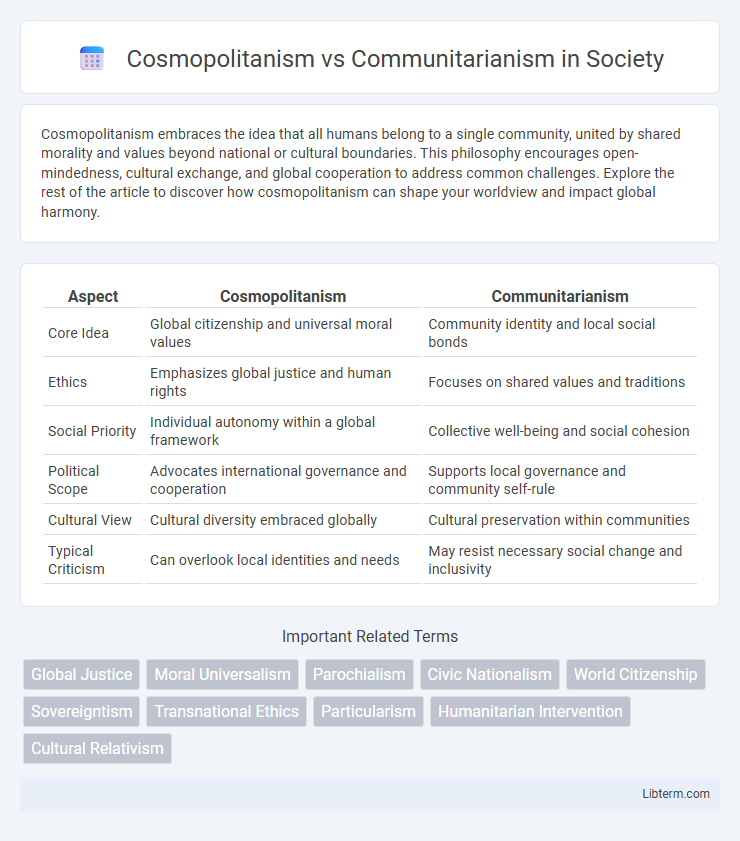Cosmopolitanism embraces the idea that all humans belong to a single community, united by shared morality and values beyond national or cultural boundaries. This philosophy encourages open-mindedness, cultural exchange, and global cooperation to address common challenges. Explore the rest of the article to discover how cosmopolitanism can shape your worldview and impact global harmony.
Table of Comparison
| Aspect | Cosmopolitanism | Communitarianism |
|---|---|---|
| Core Idea | Global citizenship and universal moral values | Community identity and local social bonds |
| Ethics | Emphasizes global justice and human rights | Focuses on shared values and traditions |
| Social Priority | Individual autonomy within a global framework | Collective well-being and social cohesion |
| Political Scope | Advocates international governance and cooperation | Supports local governance and community self-rule |
| Cultural View | Cultural diversity embraced globally | Cultural preservation within communities |
| Typical Criticism | Can overlook local identities and needs | May resist necessary social change and inclusivity |
Introduction to Cosmopolitanism and Communitarianism
Cosmopolitanism advocates for global citizenship, emphasizing shared human values and universal moral obligations beyond local or national boundaries. Communitarianism prioritizes the importance of community traditions, social practices, and shared identities in shaping individual values and responsibilities. These contrasting perspectives highlight the tension between universal ethics and localized social commitments in political philosophy.
Historical Roots of Both Philosophies
Cosmopolitanism traces its historical roots to ancient Stoicism, emphasizing universal human citizenship and moral obligations beyond local affiliations. Communitarianism emerged more prominently in the late 20th century as a critique of liberal individualism, drawing inspiration from Aristotle's political philosophy that highlights the importance of community and shared values. Both philosophies reflect enduring debates on the balance between global responsibilities and local identity in political theory.
Core Principles of Cosmopolitanism
Cosmopolitanism emphasizes the moral worth of all human beings regardless of nationality, advocating for global justice and universal human rights. It prioritizes global citizenship, promoting ethical obligations that extend beyond local or national boundaries. Core principles include equality, inclusivity, and the recognition of shared humanity transcending cultural and political differences.
Core Tenets of Communitarianism
Communitarianism emphasizes the importance of community values, social cohesion, and collective responsibility over individual autonomy, stressing that individuals derive their identity and moral framework from their social groups. It advocates for the prioritization of common good and social practices that foster solidarity, shared norms, and civic engagement, contrasting the universalist and individual-centered approach of cosmopolitanism. Key principles include the recognition of cultural particularism, the role of traditions in shaping moral duties, and the belief that ethical decision-making must consider communal context and social roles.
Global Justice: Universalism vs. Particularism
Cosmopolitanism advocates for global justice based on universal principles that transcend national and cultural boundaries, emphasizing equal moral consideration for all individuals regardless of their local affiliations. Communitarianism, by contrast, prioritizes particularism, emphasizing the role of specific communities and cultural contexts in defining justice and moral obligations. This fundamental tension shapes debates on how to balance global human rights with respect for cultural diversity and local traditions in the pursuit of justice.
Citizenship, Identity, and Belonging
Cosmopolitanism emphasizes global citizenship, advocating for individuals to identify beyond national borders and prioritize universal human rights and shared global responsibilities. Communitarianism stresses the importance of local communities and cultural ties, where citizenship is deeply connected to collective identity and social belonging within specific societies. Both frameworks negotiate the tension between inclusive global identity and rooted social bonds in shaping modern concepts of belonging and citizenship.
Political Implications in a Globalized World
Cosmopolitanism emphasizes global justice and universal human rights, advocating for political institutions that transcend national borders to address issues like climate change and inequality. Communitarianism prioritizes the values, traditions, and social cohesion of individual communities, arguing that political decisions should reflect local identities and social fabrics. The tension between these frameworks shapes policies in international relations, migration, and global governance by balancing universal responsibilities with community-specific commitments.
Human Rights: Individual vs. Community Values
Cosmopolitanism emphasizes universal human rights that protect individual freedoms and dignity across all cultures and nations, advocating for moral obligations that transcend local affiliations. Communitarianism prioritizes community values and social cohesion, arguing that human rights must be understood within the context of cultural traditions and collective responsibilities. This tension highlights the challenge of balancing individual autonomy with communal harmony in human rights discourse.
Contemporary Debates and Criticisms
Contemporary debates in cosmopolitanism versus communitarianism center on balancing global moral duties with local cultural identities, examining how universal human rights intersect with community-specific values. Critics of cosmopolitanism argue it risks eroding social cohesion by undervaluing communal bonds and traditions, while communitarianism faces challenges for potentially justifying exclusionary practices under cultural relativism. Emerging discussions emphasize integrating cosmopolitan ethics with communitarian insights to foster inclusive yet context-sensitive frameworks for justice and global cooperation.
Toward a Reconciliatory Approach
Cosmopolitanism emphasizes global citizenship and universal moral obligations, while communitarianism prioritizes local identities and community values. A reconciliatory approach advocates balancing these perspectives by recognizing the importance of global justice alongside the preservation of cultural diversity and social cohesion. This framework promotes policies that integrate universal human rights with respect for community-based practices to achieve ethical pluralism.
Cosmopolitanism Infographic

 libterm.com
libterm.com